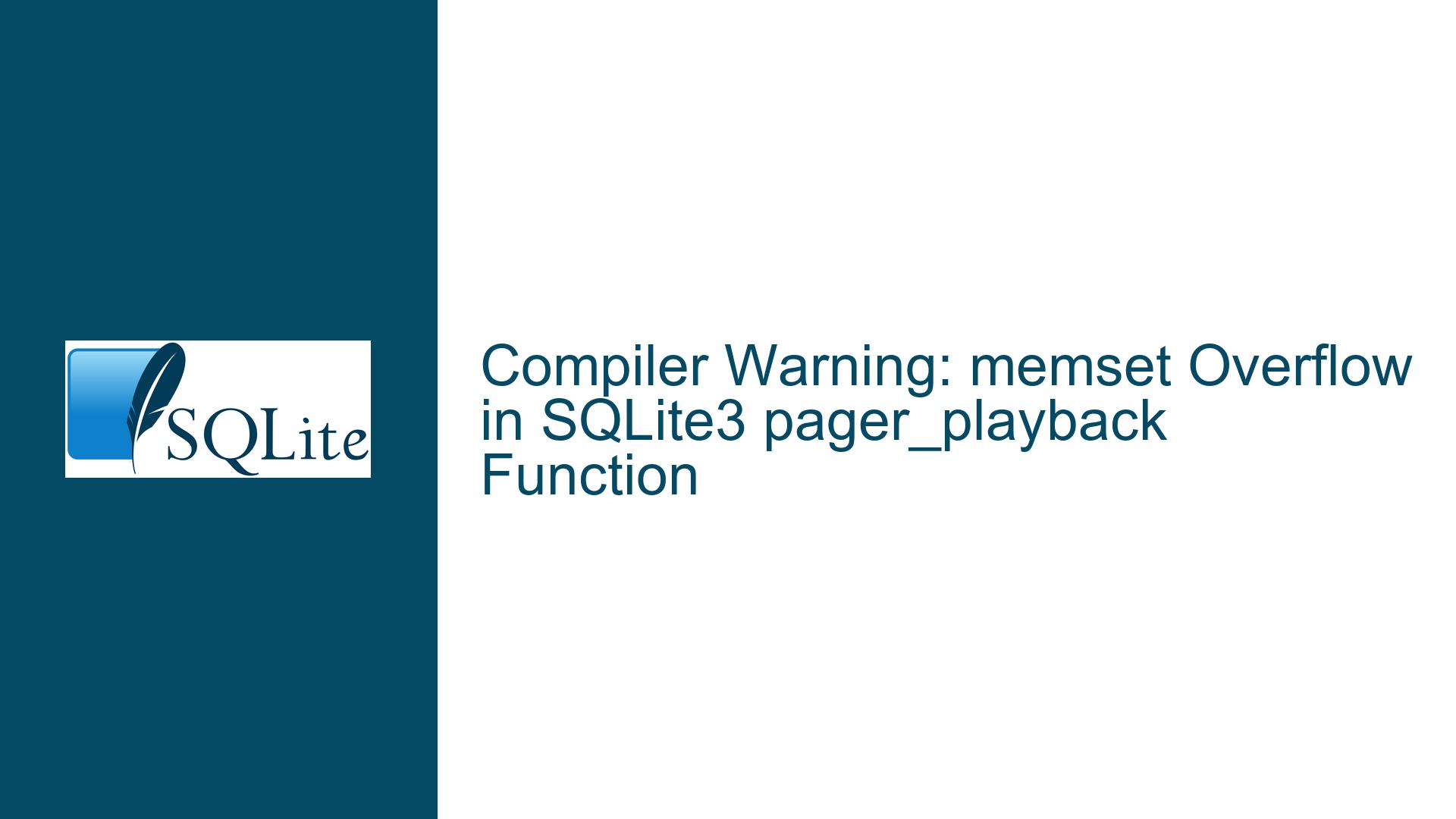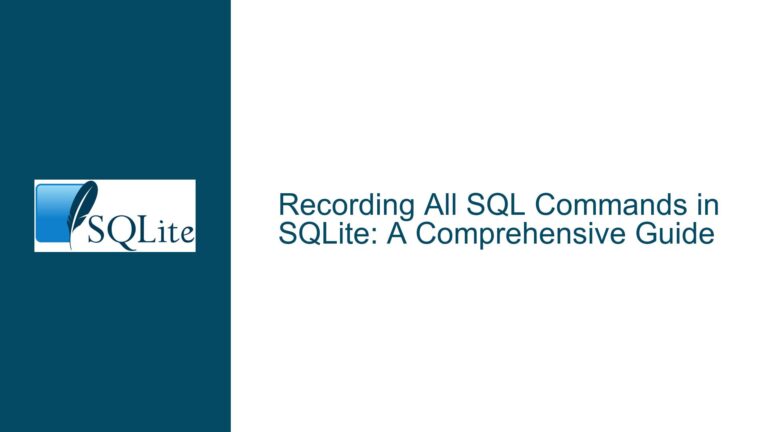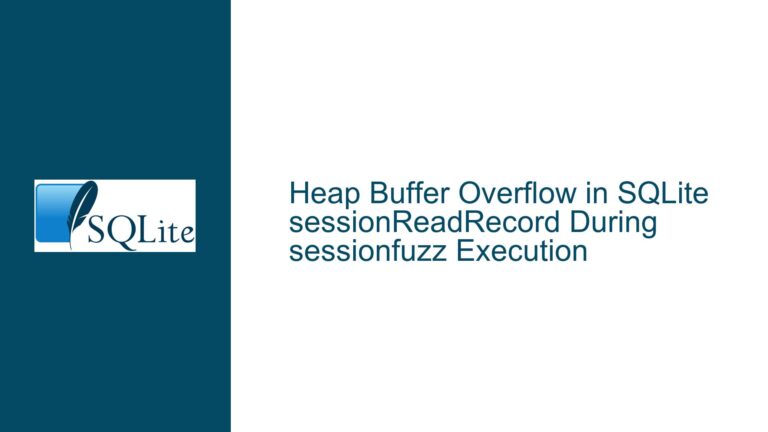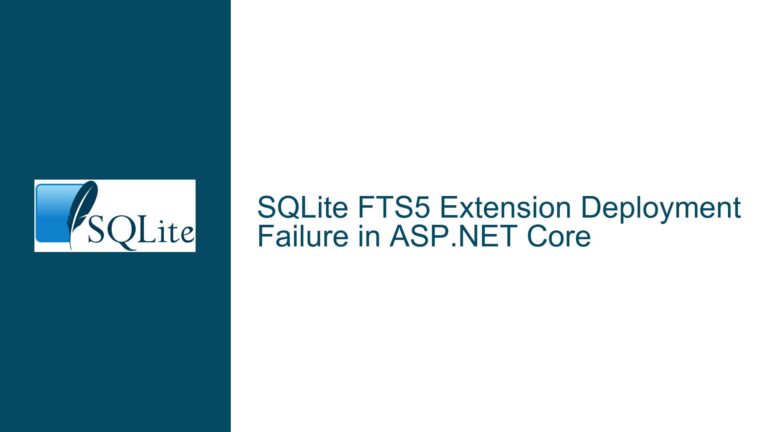Compiler Warning: memset Overflow in SQLite3 pager_playback Function
Issue Overview: Buffer Overflow Warning During SQLite3 Compilation with GCC
When compiling SQLite3 version 3.40.1 as part of a C++ project, developers may encounter a specific compiler warning related to the pager_playback function in the SQLite3 amalgamation source file (sqlite3.c). The warning manifests as follows:
/src/sqlite/sqlite3.c:58133:5: warning: ‘memset’ writing 4 bytes into a region of size 0 overflows the destination [-Wstringop-overflow=]
58133 | memset(&zSuper[-4], 0, 4);
| ^
/src/sqlite/sqlite3.c:58115:21: note: destination object ‘pPager_95(D)->pTmpSpace’ of size [0, 9223372036854775807]
58115 | zSuper = &pPager->pTmpSpace[4];
| ^
This warning arises when using GCC 12.1.0 (or similar versions) with strict compiler flags such as -Wall, -Wextra, and -pedantic. The code in question attempts to clear a 4-byte region preceding the zSuper pointer using memset(&zSuper[-4], 0, 4). The compiler interprets this as an overflow because it statically analyzes the buffer pPager->pTmpSpace as having an indeterminate size (ranging from 0 to a large positive value), leading it to assume that writing 4 bytes before zSuper exceeds the buffer’s bounds.
However, this warning is a false positive. The code is logically valid in the context of SQLite’s internal buffer management. The pTmpSpace buffer is dynamically allocated with sufficient capacity to ensure that the negative indexing operation (zSuper[-4]) does not exceed its bounds. The warning stems from limitations in GCC’s static analysis when evaluating pointer arithmetic involving dynamically allocated buffers and negative offsets.
Possible Causes: GCC Static Analysis Misinterpretation of Dynamic Buffer Offsets
1. GCC’s Overzealous Static Analysis with Negative Indices
The warning is triggered by GCC’s -Wstringop-overflow diagnostic, which attempts to detect buffer overflows by analyzing memory operations at compile time. In this case, GCC misjudges the relationship between the zSuper pointer and the underlying pTmpSpace buffer. The code initializes zSuper as &pPager->pTmpSpace[4], meaning zSuper points to the 5th byte of the buffer (assuming 1-byte elements). The subsequent memset(&zSuper[-4], 0, 4) effectively clears the first 4 bytes of pTmpSpace.
GCC’s analysis fails to account for the fact that pTmpSpace is guaranteed to be large enough to accommodate this operation. Instead, it assumes a worst-case scenario where pTmpSpace could have a size of 0, leading to an erroneous overflow warning.
2. Ambiguous Buffer Size Declaration in SQLite’s Source Code
The pTmpSpace buffer is declared as a flexible array member (or dynamically allocated array) with a size determined at runtime. In C, such buffers are annotated with size [0, 9223372036854775807] (the maximum possible size for a signed 64-bit integer). GCC’s static analyzer cannot infer the actual size of pTmpSpace during compilation, so it defaults to treating the buffer as potentially empty. This ambiguity causes the compiler to misinterpret the safety of the memset operation.
3. Compiler Heuristics for Pointer Arithmetic
GCC’s -Wstringop-overflow heuristic struggles with pointer arithmetic involving negative offsets. The expression &zSuper[-4] is equivalent to zSuper - 4, which GCC evaluates as a potential underflow if zSuper is too close to the start of the buffer. However, in SQLite’s code, zSuper is explicitly set to &pTmpSpace[4], ensuring that zSuper - 4 points to the valid start of the buffer. The compiler’s inability to track this relationship across multiple statements leads to the false warning.
Troubleshooting Steps, Solutions & Fixes: Resolving the False Positive Warning
1. Upgrade SQLite to a Version with the Warning Suppressed
The SQLite development team addressed this warning in later versions of the source code. For example, the trunk (development branch) of SQLite includes a commit that restructures the code to avoid triggering the warning. To resolve the issue:
- Step 1: Check if your project can use a newer version of SQLite (3.40.1 or later).
- Step 2: Replace
sqlite3.cin your project with the updated version from the SQLite download page. - Step 3: Recompile your project to verify that the warning no longer appears.
2. Modify Compiler Flags to Suppress the Warning
If upgrading SQLite is not feasible, adjust your compiler flags to suppress -Wstringop-overflow for the SQLite translation unit:
- Option 1: Disable the warning globally for
sqlite3.c:gcc -Wall -Wextra -pedantic -Wno-stringop-overflow -c sqlite3.c -o sqlite3.o - Option 2: Use GCC’s diagnostic pragmas to suppress the warning locally:
#pragma GCC diagnostic push #pragma GCC diagnostic ignored "-Wstringop-overflow" // Code that triggers the warning #pragma GCC diagnostic popInsert these pragmas around the
pager_playbackfunction insqlite3.c.
3. Refactor the Code to Bypass GCC’s Analysis
Modify the offending code to make the buffer arithmetic more explicit to GCC:
- Original Code:
zSuper = &pPager->pTmpSpace[4]; memset(&zSuper[-4], 0, 4); - Revised Code:
memset(pPager->pTmpSpace, 0, 4); zSuper = &pPager->pTmpSpace[4];This eliminates the negative index by directly referencing
pTmpSpace.
4. Validate Buffer Allocation Logic
Ensure that pTmpSpace is allocated with sufficient space before zSuper is initialized. In SQLite, pTmpSpace is allocated in sqlite3PagerOpen with a size derived from the page size and other parameters. Verify that this allocation guarantees at least 4 bytes of space before zSuper:
- Inspection Step: Search for
pTmpSpaceallocation insqlite3.c:pPager->pTmpSpace = sqlite3PageMalloc(pPager->nPageSize + 4);Here,
+4ensures enough space for thememsetoperation.
5. Report the Issue to GCC Maintainers
If the warning persists across projects, consider filing a bug report with the GCC team. Include a minimal reproducible example to demonstrate the false positive:
#include <stdlib.h>
#include <string.h>
struct Pager {
char *pTmpSpace;
};
void func(struct Pager *pPager) {
char *zSuper = &pPager->pTmpSpace[4];
memset(&zSuper[-4], 0, 4); // Triggers -Wstringop-overflow
}
int main() {
struct Pager p;
p.pTmpSpace = malloc(8); // Allocate 8 bytes to ensure safety
func(&p);
free(p.pTmpSpace);
return 0;
}
This example illustrates the compiler’s inability to recognize statically that the buffer is large enough.
6. Use a Different Compiler or Version
Test the code with alternative compilers (e.g., Clang) or older GCC versions to determine if the warning is specific to GCC 12.1.0. If the warning does not appear elsewhere, it reinforces the conclusion that the issue is a GCC heuristic flaw.
7. Educate Development Teams on Context-Specific Warnings
Document the warning and its false positive nature in your project’s build instructions. For example:
Build Note: The warning
-Wstringop-overflowinsqlite3.cis a known false positive caused by GCC’s static analysis limitations. It is safe to suppress this warning for the SQLite translation unit.
By methodically applying these solutions, developers can eliminate the spurious warning while maintaining code correctness and compiler rigor.






